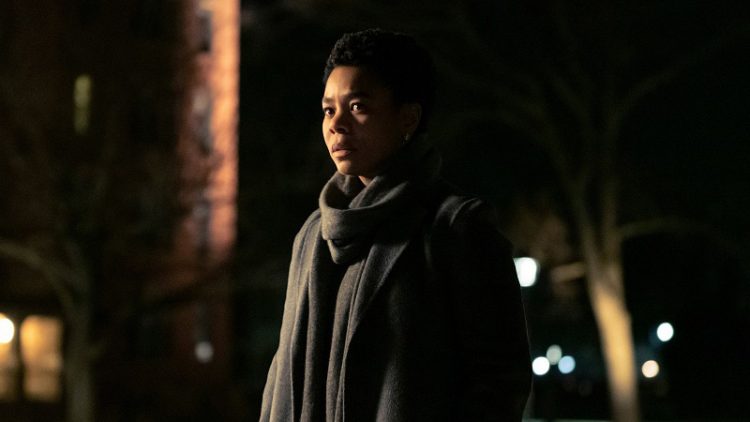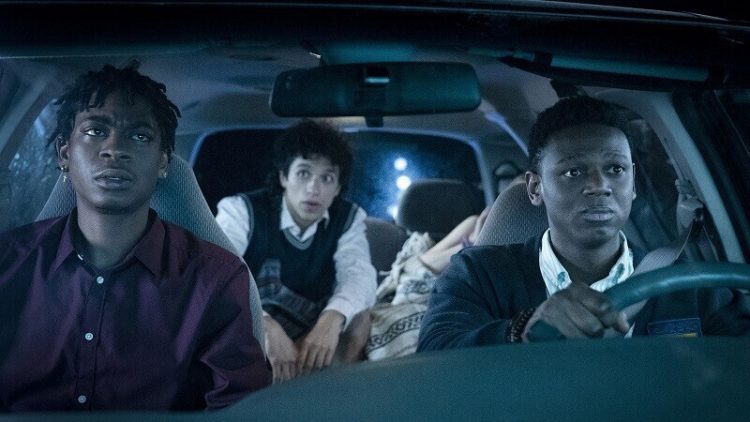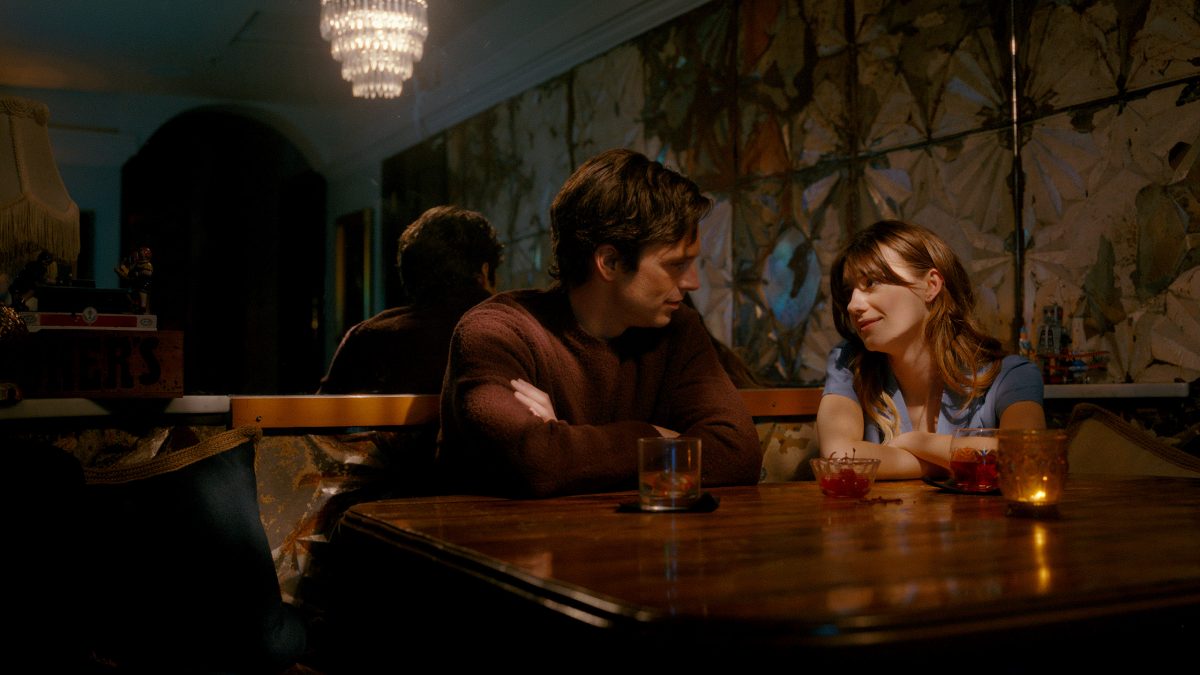![]() If there’s been a recurring trend in the American world-premieres at the 2022 Sundance Film Festival, it has been the number of films that feel explicitly bound to the contemporary social issues they are unearthing. Whether set in the present, the past or some version of both, it’s made for an interesting festival experience watching so many new American filmmakers wresting with the ways to use the medium to deliver strong arguments about the gaps and issues in American culture across lines of ethnicity and gender. Four of them, “Fresh”, “Call Jane”, Master” and “Emergency” have varying aspects that work but more often than not these socially-conscious tales felt more confident in their ideation than their technical prowess.
If there’s been a recurring trend in the American world-premieres at the 2022 Sundance Film Festival, it has been the number of films that feel explicitly bound to the contemporary social issues they are unearthing. Whether set in the present, the past or some version of both, it’s made for an interesting festival experience watching so many new American filmmakers wresting with the ways to use the medium to deliver strong arguments about the gaps and issues in American culture across lines of ethnicity and gender. Four of them, “Fresh”, “Call Jane”, Master” and “Emergency” have varying aspects that work but more often than not these socially-conscious tales felt more confident in their ideation than their technical prowess.
As far as premises go, Mimi Cave’s “Fresh” (from a screenplay by Lauryn Kahn) features the most immediately gripping “idea” at its centre. It is a perverse satire of modern dating that ends up being less peculiar than you might imagine. In “Fresh,” Daisy Edgar-Jones plays Noa, a young woman’s whose bad experiences with modern-dating seem momentarily stalled when she meets the man of her dreams – Sebastian Stan’s easy-going plastic surgeon. The early parts of the film set up a quick rapport between the pair, even as we suspect that there’s something slightly off about the union. Just when things seem to be looking up, Noa learns a disorienting truth about her beau and things begin to spiral out of control as “Fresh” goes all in on its weird premise.

The most creatively inventive aspect of “Fresh” is the deployment of its opening credits sequence which comes way after you expect, and acts as a punchline for a revelation that’s expertly handled. But very little else in “Fresh” feels as thoughtful or specific or engaged with its world. It’s like the deployment of a good joke. The opening credits, when they come, function as a kind of a punch-line. But there’s nowhere for “Fresh” to go afterwards that doesn’t feel expected. Yes, there is an angry and effective message at the centre here, and “Fresh” uses its symbolism to speak to the ways that modern dating has led to the commodification of women’s bodies. The sharpness of its central metaphor feels ripe for a really precise gothic short-story. But in this form, with its mix of satirical humour and earnest social-parable, “Fresh” struggles to meet the surety of its argument and beyond the inventiveness of the “twist,” it feels like a film stuck in its pitching stages. Very little that’s engaging comes from the actual scenarios that are set up.

In the back half of the film, we’re left to watch an inevitable struggle of good guys trying to right wrongs, but for all its creativity “Fresh” becomes staler as the minutes go by. Stan is doing his best to inject something like an arc into his role but there’s very little to do with the possibilities the film sets up and Edgar-Jones is too tepid to register as someone to root for beyond what’s happening to Noa. There’s an inherent silliness at play here that might make “Fresh” intriguing as a curio, the kind of random morbidity that might sustain a drunken sleepover. But the horror of its premise feels better suited for a brief short than this elongated film which overstays its welcome.
Good intentions are even more explicit in Phyllis Nagy’s “Call Jane”, a period piece looking at The Jane Collective – an underground Chicago group that helped women get safe abortions in 1969-1973, when it was illegal. If “Fresh” feels like its falling back on the creativity of its premise, “Call Jane” keeps falling back on the nobility of its narrative. There is nothing indictable in this tale, which finds a group of very different women banding together for the greater good. Elizabeth Banks plays Joy, the woman at the centre, whose pregnancy threatens her life but who finds herself unable to get support from any hospital to perform the life-saving abortion. It’s impossible not to feel moved by the set-up of her crisis, and we recognise how she slowly begins to change her views on abortion. But the premise can’t justify any sense of dramatic energy in “Call Jane”.
Nagy nobly builds the context and rules for this world, but any real sense of dramatic energy or arcs is non-existent in the film, which feels overly committed to telling us how to feel and delivering a superficial collection of “moments” rather than anything to invest in. It doesn’t help that Elizabeth Banks, as the story’s centre, is giving the least interesting performance here, and is eclipsed by every performer she shares the screen with – Kate Mara, eking something interesting out of a best-friend role; Sigourney Weaver, committed to complicating the de facto leader of the group; and even Chris Messina, giving depth to an empty role as Joy’s husband.
The expected crawl at the film’s end telling us the results of their efforts assures us that this is all important vital business. And yes, the subject is vital but as communicated in the film the actual lives of these characters feel too often listless. Greta Zozula’s cinematography offers us a sunny trip to the past, but everything feels weightless within it. For all the seriousness in the script, “Call Jane” is consistently finding the least interesting version of these characters and their arcs, so by the end it feels like a bad version of a potentially interesting article from the New Yorker. Little in its lensing or dramaturgical prowess feels confident or essential.
More ambitious, although not altogether successful is Mariama Diallo’s “Master,” where race and gender intersect in a look at white academia for Black women. Luckily, “Master” has an excellent performance at its centre in the form of Regina Hall’s Gail Bishop. Gail is the newly appointed “Master” at Ancaster, a north-eastern university with whiteness embedded in its marrow. It is so white that Gail is the first Black Master, in this centuries-old institution. Elsewhere, Jasmine is a new Black freshman acclimating to the mostly white campus and trying to make sense of the campus legend that warns of a witch from the Salem Trials whose ghosts arrives each year, on the anniversary of her death, to take an unlucky soul with her. Jasmine is also dealing with the new intensity of tertiary-level study with a Black professor (Amber Gray as Liv) who seems to be holding her to unreasonable standards. Soon enough “Master” will weave the three women’s stories into a recognisably horrifying image of Blackness in a sea of oppressive whiteness, and the film is most confident in the moments it allows the women to interact with each other. But there’s a lot that it wants to examine, and so the middle section of “Master” finds itself juggling with a lot. The film is ostensibly offering social-parable by way of horror, but its horror sequences are less thrilling and assured than the dramatic moments where it allows its characters to give voice to their discomfort and ambivalence.
It’s the kind of earnest, socially conscious tale that carries its emotions on its sleeve to the occasional detriment of its clarity. In its attempt to conjure feelings of confusion and unease during its mid-film sequence, “Master” occasionally feels more muddled than it should be. That feeling of being muddled informs the resolution, which feels a bit too muted to work within the fabric of this world, where the supernatural and the realistic don’t quite work together. But it’s all threaded by Regina Hall at its centre, and it’s to its credit that in its final moments “Master” allows her tired realisations ground the conclusion in something that feels marginally cathartic, if unfinished.
Of this smattering of socially conscious films, the best of the lot is “Emergency,” which is the only film of this quartet that feels as keyed into its social intentions and its work as a film. Like a number of Sundance releases this year, “Emergency” is a feature-length adaptation of a short-film following a night of terror as three male college students (two Black, one Hispanic) struggle with the options available to them when a passed out white girl turns up on their living room floor. “Emergency” is fraught with contemporary tensions but immediately earns itself a level of grace by its willingness to resist turning its characters into speechifying tools for the creative team. The film’s awareness of how things can quickly go awry is distinct throughout, but “Emergency” manages to work as a film completely keyed into the young-adult humour of its principals while developing into a thoughtfully engaged comedy with these characters, these worlds and their experiences that’s about more than just the over social parable.
The central arc is the friendship between the more outgoing Sean (RJ Cyler) and his straitlaced best-friend Kunle (Donald Elise Watkins). “Emergency” uses these different versions of black manhood not as a cudgel to pound home its themes about being Black in America, but to thread a thoughtful and warm tale about friendship that feels earned and earnest throughout. A lot of that comes from Carey Williams’ direction, which, especially in early moments, creates a fabric of deadpan humour that will be sustained throughout. It also comes from Williams’ sharpness with his cast, giving each performer the space to perform these college-level antics in a film that doesn’t try to sacrifice its collegiate vibes for the message within it. Sebastian Chacon as the third member of the trio is giving an expert comedic performance on the fringes of the film that should signal a long career ahead of him.
It’s a welcome relief that whole “Emergency” moves along with an awareness of our expectations in a film like this, it wilily subverts the most obvious places in its climaxes. “Emergency” is fun, but also nerve-wracking in a way that some of the ostensible thrillers from Sundance this year feel unable to scale. The climax might be what you expect, but in its final scene “Emergency” reveals itself as something so much more interesting and thoughtful than some kind of banal riff on “showing the real world of racism in America”. A string of moments at the very end tease us with something prosaic until it opts to retain its sensibilities, announcing that it’s avoiding the kind of treacly, unsubtle entry that it very much could be. It’s a confidently rewarding entry in the college-buddy-comedy and will be a welcome arrival when it premieres for audiences later in the year.
“Fresh” has been slated for a digital release in March; “Emergency” will be released in May and “Master” and “Call Jane” are set for distribution later in 2022

